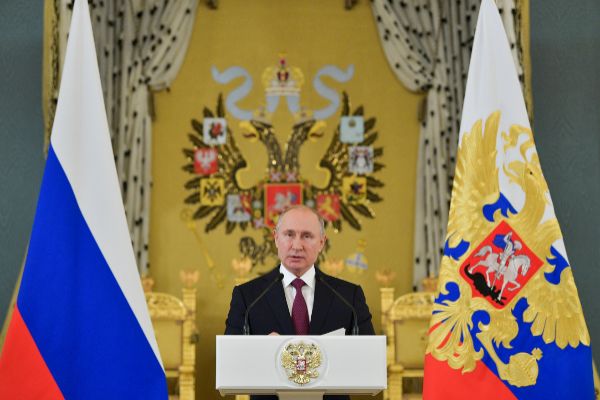- Russia: More than 1,000 detainees during an opposition demonstration in Moscow
- Russia Vladimir Putin says he will not be the first to deploy new missiles
"I don't like election campaigns." It was the first words that came from the mouth of Vladimir Putin, director of the FSB (successor of the KGB) that day in August 1999, when President Boris Yeltsin called him to his office to inform him that a few days later, on August 9 , would be appointed prime minister of Russia .
Russia had been strolling in the troubled river of capitalism for less than a decade. Bill Clinton was still in the White House . Jaques Chirac, in the Elisha. Tony Blair had only been on Downing Street for two years and Jiang Zemin was in charge of a giant named China who was said to conquer the 21st century. It has been 20 years since that time and Putin has proven to be a good electoral asset, although he still doesn't like rallies. The problem is that today, and with the constitutional expiration date appearing in four years, the power has no other exponent than itself.
Almost no one among the Russian population under 30 remembers another person in charge. But there was a time when the heads of government lasted less than many foods in the refrigerator . "Yeltsin fulminates his fourth prime minister in 17 months and appoints the head of the KGB," titled EL MUNDO on the cover the next day. That drunk Russian leader needed someone to help him close all the fronts he had open: justice surrounded members of his family, Chechen separatists challenged Moscow's authority, inflation was a crouched threat and, above all, on the way back a fierce electoral campaign began that summer that would devour the remains of the 'yelsinate'.
In his memoirs 'Midnight Diaries' the acclaimed Yeltsin admits that he feared the country would be out of control. Today Putin, 66, faces other problems in his political 'fall'. In the short term, the authorities have resumed the initiative with a campaign that seeks to silence the leaders of the protests these days and scare their supporters.
The Russian Instruction Committee has also come to tighten the nuts and has even opened a criminal case for "mass riots" and there are already ten young people charged . His crimes: things like snatching the helmet from a riot police, throwing a plastic bottle against the police, or simply making hand instructions to direct the crowd. At the same time, accounts are blocked and money laundering is accused by several employees of the investigative anti-corruption platform of the opponent Alexei Navalny between 2016 and 2018.
In the medium term Putin faces a growing fatigue of the political mask that gives institutional legitimacy to the government , the United Russia party. There are some contradictions resulting from the never-ending liberalization: the worsening of living conditions due to the crisis of these years has undermined its popularity and that of its government even in the provinces, but the recent improvements and reforms that are yet to come can disturb the fragile political balance that ensures its power. "The reforms that reduce state prominence, however, would undermine the most important pillars of the Putin regime, because employees of government and state-owned companies are their most reliable base," says Leonid Bershidsky, founder of the Russian media 'Slon.ru'. Not to mention the bosses of those companies, millionaires who have flourished or matured in their shadow: " Putin needs to keep his cronies happy if he wants to avoid a stab in the back ." And on the horizon threatens the fall of private investment and the chronic flight of capital.
Putin, although it has fallen in terms of popularity from 80% to 60%, remains at levels of acceptance difficult to imagine in Europe or the US. His term ends in 2024, but few analysts believe that the longest-running leader of the Kremlin since Joseph Stalin resigns power completely. The alternatives are three: constitutional reform that allows to re-present itself, creation of a reinforced post to guard the future or point (perhaps at the last moment, as Yeltsin did) to a successor.
Two things convinced Yeltsin that Putin could be his man. He had begun to see him by the Kremlin in 1997 as number two of a department dedicated to the regions and distinguished himself by being able to react to presidential outbreaks by arguing rationally and without getting red or panicking like the rest. He was also impressed by Putin's loyalty, which he had risked by putting former St. Petersburg Mayor Anatoly Sobchak, his political godfather, safe from his problems with justice (taking him out of the country). The current president has many loyalists today but the presidential power today has less counterweights and the country has become accustomed to a 'managed' democracy where citizens choose their rulers in less competitive elections.
Putin arrived as a reformer promising to put order. Its historical mission has been to restore dignity to a humiliated country after the Cold War. But the US adventures in Afghanistan, Iraq or Libya and the convulsions in Ukraine (which he considers warped by Washington) disappointed him until he was in a collision course with the West. Putin has managed to simplify the Russian present, but the future seems very complicated for a newcomer.
According to the criteria of The Trust Project
Know more- Vladimir Putin
- Ukraine
- Russia
The Look of the CorrespondentUkraine will launch a channel in Russian to win the information war
The Look of the CorrespondentUkraine no longer speaks with Russia or on television
Russia Vladimir Putin says he will not be the first to deploy new missiles

